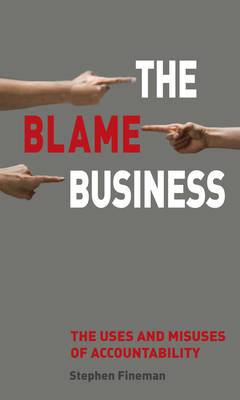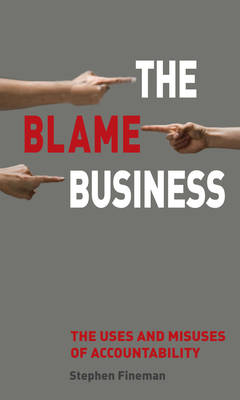
- Afhalen na 1 uur in een winkel met voorraad
- Gratis thuislevering in België vanaf € 30
- Ruim aanbod met 7 miljoen producten
- Afhalen na 1 uur in een winkel met voorraad
- Gratis thuislevering in België vanaf € 30
- Ruim aanbod met 7 miljoen producten
Zoeken
€ 42,45
+ 84 punten
Omschrijving
Whenever anything goes wrong our first instinct is often to find someone to blame. Blame infuses our society in myriad ways, seeding rancor and revenge, dividing lovers, coworkers, communities, and nations. Yet blame, appropriately placed and managed, safeguards moral order and legal culpability. In this book, Stephen Fineman explores this duality inherent in blame, taking us on a fascinating journey across blame's sometimes bitter--sometimes just--landscape. Fineman focuses on blame's roots and enduring manifestations, from the witch hunts of the past to today's more buttoned-up scapegoating and stigmatization; from an individual's righteous anger to entire cultures shaped by its power. Addressing our era of increasing unease about governance in public and private enterprises, he delves behind the scenes of organizations infected with blame, profiling the people who keep its plates spinning. With a critical eye, he examines the vexing issue of public accountability and the political circus that so often characterizes our politicians and corporations lost in their "blame games." Ultimately, Fineman raises the challenging question of how we might mitigate blame's corrosive effects, asking crucial and timely questions about the limits of remorse and forgiveness, the role of state apologies for historical wrongdoings, whether restorative justice can work, and many other topics. An absorbing look at something we all know intimately, this book deepens our understanding of blame and how it shapes our lives.
Specificaties
Betrokkenen
- Auteur(s):
- Uitgeverij:
Inhoud
- Aantal bladzijden:
- 160
- Taal:
- Engels
Eigenschappen
- Productcode (EAN):
- 9781780234380
- Verschijningsdatum:
- 15/05/2015
- Uitvoering:
- Paperback
- Formaat:
- Trade paperback (VS)
- Afmetingen:
- 157 mm x 196 mm
- Gewicht:
- 172 g

Alleen bij Standaard Boekhandel
+ 84 punten op je klantenkaart van Standaard Boekhandel
Beoordelingen
We publiceren alleen reviews die voldoen aan de voorwaarden voor reviews. Bekijk onze voorwaarden voor reviews.











